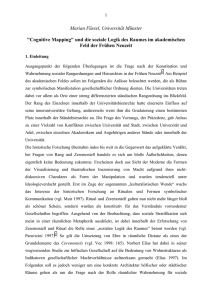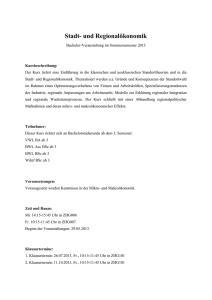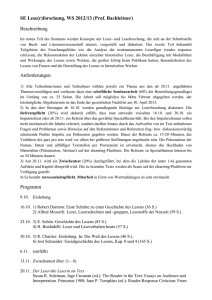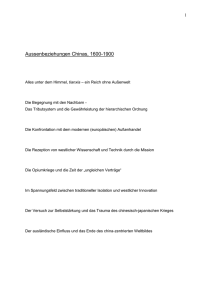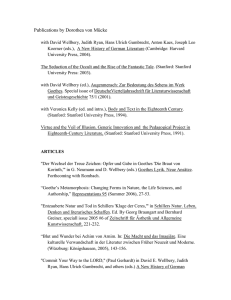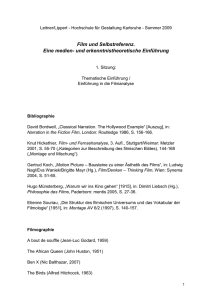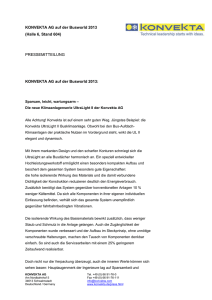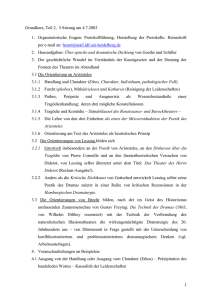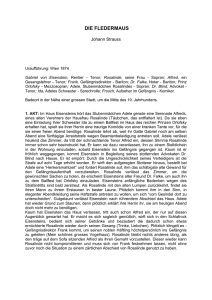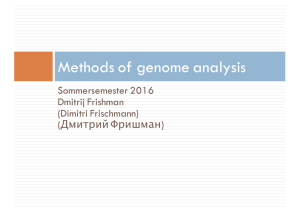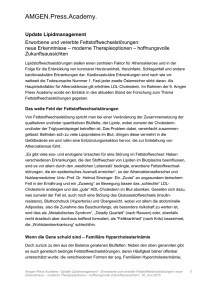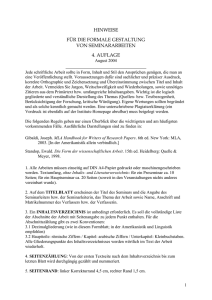Handout zur Vorlesung vom 9.12.2003 als
Werbung
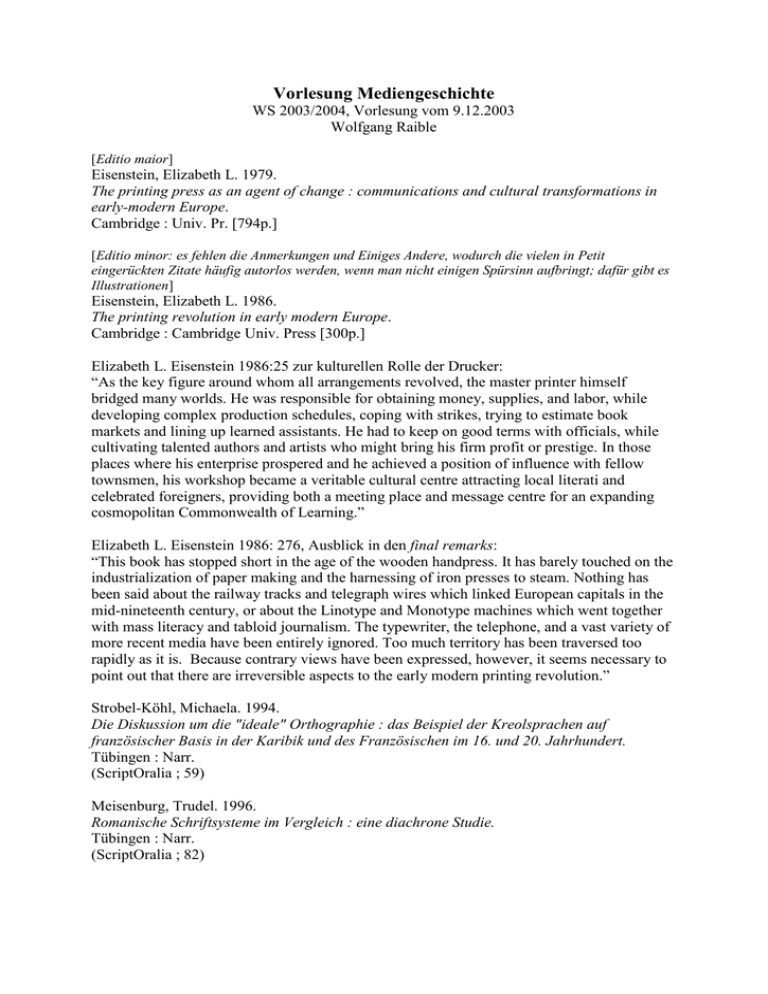
Vorlesung Mediengeschichte WS 2003/2004, Vorlesung vom 9.12.2003 Wolfgang Raible [Editio maior] Eisenstein, Elizabeth L. 1979. The printing press as an agent of change : communications and cultural transformations in early-modern Europe. Cambridge : Univ. Pr. [794p.] [Editio minor: es fehlen die Anmerkungen und Einiges Andere, wodurch die vielen in Petit eingerückten Zitate häufig autorlos werden, wenn man nicht einigen Spürsinn aufbringt; dafür gibt es Illustrationen] Eisenstein, Elizabeth L. 1986. The printing revolution in early modern Europe. Cambridge : Cambridge Univ. Press [300p.] Elizabeth L. Eisenstein 1986:25 zur kulturellen Rolle der Drucker: “As the key figure around whom all arrangements revolved, the master printer himself bridged many worlds. He was responsible for obtaining money, supplies, and labor, while developing complex production schedules, coping with strikes, trying to estimate book markets and lining up learned assistants. He had to keep on good terms with officials, while cultivating talented authors and artists who might bring his firm profit or prestige. In those places where his enterprise prospered and he achieved a position of influence with fellow townsmen, his workshop became a veritable cultural centre attracting local literati and celebrated foreigners, providing both a meeting place and message centre for an expanding cosmopolitan Commonwealth of Learning.” Elizabeth L. Eisenstein 1986: 276, Ausblick in den final remarks: “This book has stopped short in the age of the wooden handpress. It has barely touched on the industrialization of paper making and the harnessing of iron presses to steam. Nothing has been said about the railway tracks and telegraph wires which linked European capitals in the mid-nineteenth century, or about the Linotype and Monotype machines which went together with mass literacy and tabloid journalism. The typewriter, the telephone, and a vast variety of more recent media have been entirely ignored. Too much territory has been traversed too rapidly as it is. Because contrary views have been expressed, however, it seems necessary to point out that there are irreversible aspects to the early modern printing revolution.” Strobel-Köhl, Michaela. 1994. Die Diskussion um die "ideale" Orthographie : das Beispiel der Kreolsprachen auf französischer Basis in der Karibik und des Französischen im 16. und 20. Jahrhundert. Tübingen : Narr. (ScriptOralia ; 59) Meisenburg, Trudel. 1996. Romanische Schriftsysteme im Vergleich : eine diachrone Studie. Tübingen : Narr. (ScriptOralia ; 82) Catach, Nina. 1968. L' orthographe française à l'époque de la renaissance : (auteurs, imprimeurs, ateliers d'imprimerie). Genève : Droz. (Publications romanes et françaises / Société de Publications Romanes et Françaises ; 101) Martin Fontius. 1989. Voltaire. Ein Lesebuch für unsere Zeit. Berlin und Weimar: Aufbau–Verlag 1989, S. xxxvii f.: «Die Verbindung des Dichterfürsten und des führenden Historikers in einer Person konnte nur dazu führen, daß Voltaire früher oder später der Platz eines Oberhauptes der französischen Aufklärung zufiel. Die Universalität vierlieh ihm einen Status, von dem aus im Rückblick – mit Paul Valéry zu reden – ‘die großen Männer des Zeitalters Ludwigs XIV wie Chorknaben’ erscheinen können. Sie haben alle ihr Talent nur in den Grenzen einer Gattung eingesetzt: Molière schrieb nur Komödien, Racine Tragödien, La Rochefoucauld Aphorismen. Der Schriftsteller der Aufklärungsperiode, den Voltaire exemplarisch verkörpert, bewegt sich im Bereich der Poesie wie der Prosa, und der gesellschaftliche Wirkungsraum der Literatur erweiterte sich entsprechend. Gewiss erschien 1751 auch der erste Band der von Diderot und d’Alembert geleiteten Enzyklopädie. Das Gewicht dieses Unternehmens und die geistige Autorität Diderots sind indessen nicht identische Größen. Zu Recht hat der Diderot–Forscher Paul Verrière davor gewarnt, sich durch das Wort ‘Enzyklopädist’ blenden zu lassen: “Diderot, Leiter eines gigantischen Editionsunternehmens, ist niemals Haupt eines Clans gewesen. Der Führer ist seit der Jahrundertmitte unbestritten Voltaire, der dank dem völligen Einverständnis von d’Alembert der französischen Intelligenz sehr früh ihre Einheit, ihren Zusammenhalt und ihre Wirksamkeit verliehen hat“». Darnton, Robert. 1979. The business of enlightenment : a publishing history of the "Encyclopédie" 1775 – 1800. Cambridge/MA : Harvard Univ. Press : The Belknap Press. Übers. in Frz., Ital., Dt. und Pg. Darnton, Robert. 1988. L' aventure de l'encyclopédie 1775 - 1800 : un best-seller au siècle des lumières. Préf. d'Emmanuel Le Roy Ladurie. Trad. de l'américain par Marie-Alyx Revellat. Paris : Perrin. Darnton, Robert & Roche, Daniel (eds.). 1989. Revolution in print : the press in France ; 1775 – 1800. Berkeley/CA : Univ. of Calif. Press. Darnton, Robert. 1991. Édition et sédition : l'univers de la littérature clandestine au XVIII. siècle. Paris : Gallimard. (NRF Essais) Übers. in Dt., Ital., NL, Jap., Span., Pg.,. Darnton, Robert. 1996. The forbidden best-sellers of pre-revolutionary France. 1. publ. as a Norton paperback. New York, NY : Norton. Übers. ins Ital., Pg., Schwed. und Dt.. Darnton, Robert. 1995. The corpus of clandestine literature in France : 1769 – 1789. 1. ed.. - New York ; London : Norton [Companion volume to the author's The forbidden bestsellers of pre-revolutionary France.] Darnton, Robert. 1996. Denkende Wollust. Frankfurt/Main : Eichborn Verlag. (Anthologie, Textauswahl und Einleitung [S. 7-44] von Darnton.) Darnton, Robert. 1997. George Washingtons Falsche Zähne oder Noch Einmal: Was Ist Aufklärung? München : C.H. Beck. Schlup, Michel & Darnton, Robert & Schmidt, Michael. 2002. L' édition neuchâteloise au Siècle des Lumières: la Société Typographique de Neuchâtel : (1769 - 1789). [cet ouvrage accompagne l'exposition organisée sur le même thème et sous le même titre ... du 1er novembre 2002 au 30 avril 2003]. Bibliothèque Publique et Universitaire. Recueil d'études par Michel Schlup. Textes de Robert Darnton ... . Catalogue des livres de la STN / établi par Michael Schmidt. Neuchâtel : Bibliothèque Publique et Universitaire. (Patrimoine de la Bibliothèque publique et universitaire ; 5) Darnton, Robert. 2002. Poesie und Polizei : öffentliche Meinung und Kommunikationsnetzwerke im Paris des 18. Jahrhunderts. Aus dem Amerikan. von Burkhardt Wolf. Orig.-Ausg., Dt. Erstausg.. - Frankfurt am Main : Suhrkamp. (Erbschaft unserer Zeit ; 15) (Edition Suhrkamp ; 2231) [Public opinion and communication networks in eighteenth century Paris.] Raible, Wolfgang. 1991. Die Semiotik der Textgestalt. Erscheinungsformen und Folgen eines kulturellen Evolutionsprozesses. Heidelberg: Winter. (Abhandlungen der Heidelberger Akademie der Wissenschaften, phil.-hist. Klasse, Jg. 1991, Abhandlung 1). Raible, Wolfgang. 1993. "Die Entwicklung ideographischer Elemente bei der Verschriftung des Wissens". In: Kullmann, Wolfgang/Althoff, Jochen (Eds.). Vermittlung und Tradierung von Wissen in der griechischen Kultur. Tübingen: Narr. (ScriptOralia, Band 61): 15-37. Wolfram, Stephen. 2000. “Mathematical Notation: past and future.” October 20, 2000 Transcript of a keynote address presented at MathML and Math on the Web: MathML International Conference 2000 http://www.stephenwolfram.com/publications/talks/mathml/
